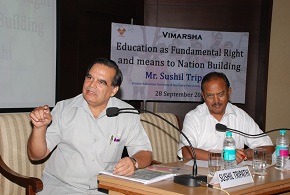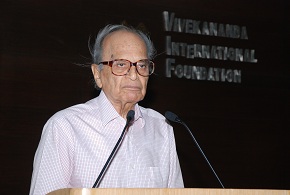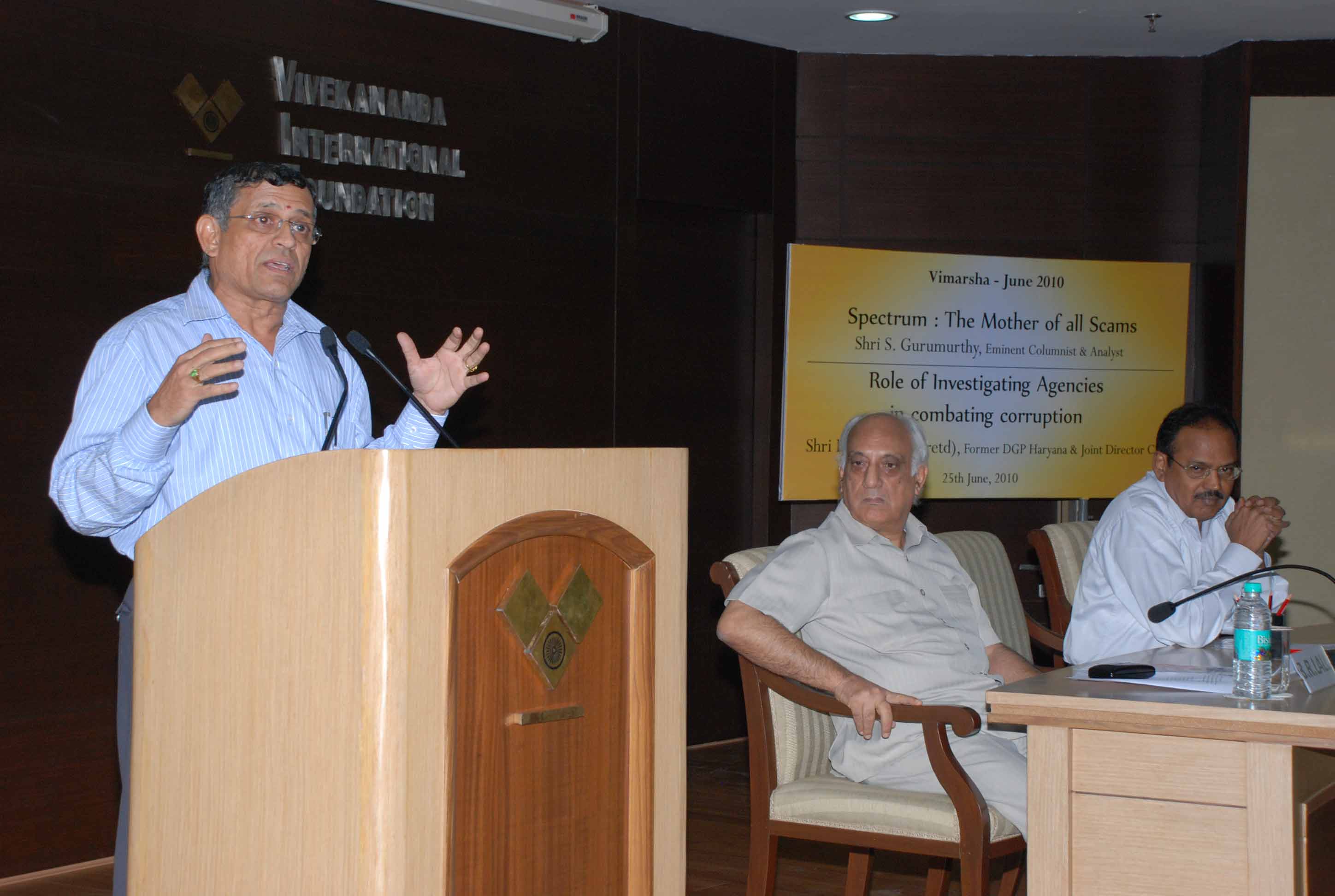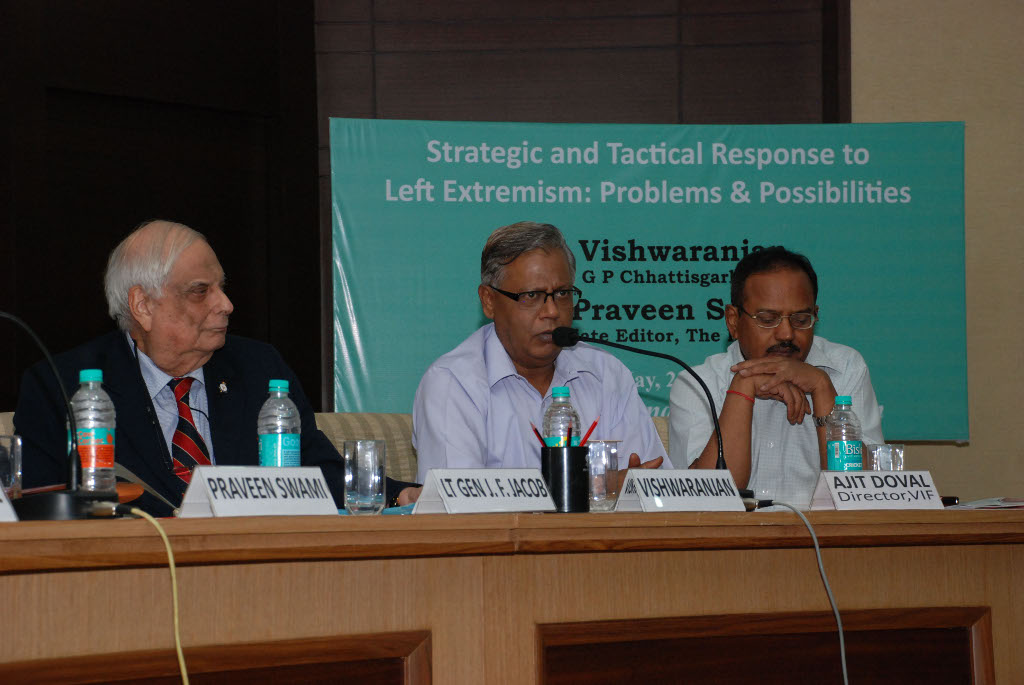The Ayodhya debate was unnecessary: Koenraad Elst The talk ‘Ayodhya Verdict : How the History will judge it?’ was delivered by Shri Koenraad Elst, the noted indologist and historian, at Vivekananda International Foundation on 14th December 2010 as part of its monthly talk series Vimarsha. The function was presided by Shri. K.N. Bhat, the eminent lawyer who represented the Ram Lala Virajman, (the deity at Ayodhya temple), in the Ayodhya title suit in Allahabad High court.
Mr. Sushil Tripathi, former Secretary Education spoke on the subject of “Education as a Fundamental Right and Means to Nation Building”, at the VIF Auditorium on 28 September 2010. Introducing the speaker and the subject, the Director, Mr. Doval said the real power of a nation today is measured in terms of knowledge. Education bridges the gap between being and becoming. Today, the country is seized with the idea of giving a new impetus to education.
The eminent and highly respected Civil Servant, Dr. Mahesh N Buch gave a very spirited talk on the Importance of Governance in India’s Future, at the VIF Auditorium on 30 Aug 10. He highlighted the role of decisive leaders like Margaret Thatcher who displayed the will to govern. He lamented that in India, slogans have replaced programmes. He spoke of his extensive stints as an Administrator in the tribal Bastar regions and highlighted the painful lack of delivery and development.
Mr Jagmohan, the fiesty former governor of J&K gave an impassioned talk on Civilisational Imperatives and India's Nation Building at the VIF on 29 July,2010. He defined civilisation as the manifestation of the intellectual, cultural, social and moral attainments of a community. He then evaluated India's civilisational developement in these terms. Very pertinently he asked- the freedom struggle had thrown up a large number of stalwarts and great leaders. Why have we failed to produce great thinkers and reformers in the post- independence era? He dilated upon his own efforts for reforming the Vaishno Devi Shrine which today attracts over 80 lakh pilgrims a year (up from just 5 lakhs in 1990) and to encourage research on the Saraswati River and Vedic civilisation. He spoke of the need to revisit the core of Hinduism - that life is all divinity and we are aspects of that divinity. There is a need to go back to the Vedic/Upanishadic roots of Hinduism today and purge it of subsequent malpractices/distorted customs.
“To stem out corruption, the anti-corruption bodies should be empowered and the investigating agencies freed from executive control”, suggested B R Lall while delivering the monthly talk Vimarsh at VIF on the ‘Role of Investigating Agencies in Combating Corruption’. Noted columnist S. Gurumurthy gave an overview of the level of corruption in the Indian system and presented a detailed account of the ‘2G Spectrum Scam’ involving senior ministers, bureaucrats and private companies. He claimed that a systemic deficiency in pursuing corruption is on account and it is the manifestation of power of the corrupt and corruptor on the entire system. Political corruption, Gurumurthy added, can be reduced if politicians maintain honesty and probity in public life for which they can be accountable, thereafter.
“We should not fall into the false perception that the Maoists today have deviated from the original ideology of Mao and have become hoodlums and extortionists, but should realise that they have moved closer to the original thought and strategy of capturing a nation’s power through violence” said Vishwaranjan, DGP of the most highly Naxal affected state of India – Chhattisgarh. He was speaking at a discussion ‘Strategic and Tactical Response to Left Extremism: Problems & Possibilities’, at VIF on May 29, 2010. He said that the strategy used in Andhra Pradesh to contain Naxalism may not be effective now in other states as the Maoists strategy has advanced from guerrilla warfare to mobile warfare. Praveen Swami,Lt.Gen JFR Jacob,R.K.Khandelwal were the other speakers.
A very interesting and thought provoking session on "How to develop National Consensus on Critical National Issues" was held on 10 May 2010 at the VIF.The two speakers were Mr Manish Tewari, the articulate Member of Parliament from the Indian National Congress (Party spokesperson) and Dr. Chandan Mitra, former Member of the Rajya Sabha , Editor and Managing Director Pioneer and member of National Executive of BJP. Mr Mitra highlighted the need for consensus building in three primary areas - National Security, Foreign Policy and Macro-Economic Issues. He felt that the structure of Indian politics had become bipolar. The two main national parties must devise mechanisms for consensus building in these key areas. Ideological differences however would remain. Manish Tewari of the Congress presented the contra argument. He felt that the essence of democracy was plurality of opinion. It went beyond listening to a dogged majority but allowed space for a creative minority. That said, he felt there is a congruence on major national issues even though we may quibble on issues of tactics/ execution.
Michel Danino, the well known author of the "Lost River: On the Trail of the Sarasvati" gave a fascinating presentation on the archeological and geological evidence regarding the existence of this once mighty river that was the life stream of the Indian Civilisation. It stands out as a unifying thread of connectivity in the ebb and flow of the unique civilisation of India. This talk was a part of the" Civilisational and Historical Studies" that are a core project of the VIF. The fascinating presentation left the audience enthralled.
His Holiness Dalai Lama addressed a packed gathering of diplomats, intellectuals and eminent citizens in the auditorium of the Vivekananda International Foundation on 20 March 2010. In the talk, jointly organised by Vivekananda Internaitonal Foundation and the Association of Indian Diplomats, Dalai Lama covered wide range of subjects like ecological degradation, India's civilisational heritage, Non-Violence as an instrument of state policy, problems faced by Tibetean people etc. His Holiness in his most captivating style also responded to a large number of questions fielded to him after the talks.
His Holiness Dalai Lama addressed a packed gathering of diplomats, intellectuals and eminent citizens in the auditorium of the Vivekananda International Foundation on 20 March 2010. In the talk, jointly organised by Vivekananda Internaitonal Foundation and the Association of Indian Diplomats, Dalai Lama covered wide range of subjects like ecological degradation, India's civilisational heritage, Non-Violence as an instrument of state policy, problems faced by Tibetean people etc. His Holiness in his most captivating style also responded to a large number of questions fielded to him after the talks.




